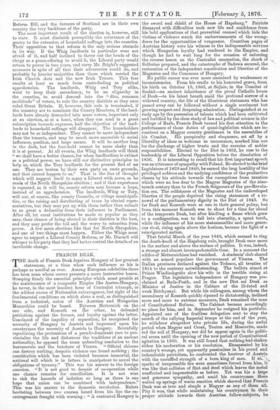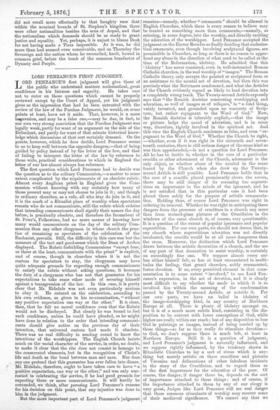FRANCIS DEAN.
,•THE death of Francis Deak deprives Hungary of her greatest statesman, at a time when such influence as his is perhaps as needful as ever. Among European celebrities there has been none whose career presents a more instructive lesson. Grasping firmly the essential principles which must preside at the maintenance of a composite Empire like Austro-Hungary, he never, in the most insolent hour of Centralist triumph, or the wildest excess of Nationalist extravagance, lost sight of the fundamental conditions on which alone a real, as distinguished from a technical, union of the Austrian and Hungarian Monarchies could be based. Between Metternich on the one side, and Kossuth on ihe other, he defended patriotism against the former, and loyalty against the latter. Convinced of the impolicy of separation, he recognised the necessity of Hungary to Austria and impressed upon his countrymen the necessity of Austria to Hungary. Scornfully repudiating the pretensions of a pseudo-dominant race to pro- vincialise the life and dishonour the traditions of an ancient nationality, he opposed the same unbending resolution to the bureaucrats and the butchers of Vienna. "Official chicane can destroy nothing, despotic violence can found nothing ; the constitution which has been violated becomes immortal, the national will which is in fetters is omnipotent to annul the .obligations of tyranny." This was his answer to the foreign coercion. "it is not good to despair of co-operation while one chance remains for conciliation. It is not wise to risk the hazards of isolation so long as there is one hope that union can be combined with independence." This was his answer to the domestic revolution. Rulers hesitating between two courses heard from his lips the en- couragement fraught with warning : "A contented Hungary is
the sword and shield of the House of Hapsburg." Patriots dismayed with difficulties took new life and confidence from his bold applications of that proverbial counsel which bids the victims of violence watch the embarrassments of the wrong- doers for the opportunities of vengeance. Countless pages of Austrian history were his witness to the indispensable services which Hungarian loyalty had rendered to the Empire, and though he had to wait long for the occasion of enforcing the reverse lesson on the Centralist usurpation, the shock of Solferino prepared, and the catastrophe of Sadowa secured, the restoration of the independent constitution and liberties of the Magnates and the Commons of Hungary.
No public career was ever more unstained by weaknesses or inconsistencies. From his cradle to his honoured grave, from his birth on October 13, 1803, at Sojhor, in the Comitat of Szalad—an ancient inheritance of the proud Catholic house of Deak—to his latest breath amid the profound sorrow of a widowed country, the life of the illustrious statesman who has passed away can be followed without a single sentiment but growing respect and deepening admiration. Distinguished at an early age by the possession of talents which had been cultivated and fortified by the close study of law and political science in the College of Raab, Francis Deak turned his first attention to the performance of those duties of quasi-legislation which are in- cumbent on a Magyar country gentleman in the assemblies of his Comitat. His perspicuity and eloquence, sat off by a liberality of ideas as welcome as uncommon, marked him out for the discharge of higher trusts and the exercise of nobler responsibilities. Elected to the Diet in 1832, he rose to the leadership of the Liberal Opposition before the dissolution of 1836. It is interesting to recall that his first important spiech was an utterance of sympathy with Poland. Re-elected to the brief Legislature of 1839 and 1840, he earned the long hostility of the privileged noblesse and the undying confidence of the productive classes by his attitude towards the exemptions from taxation which were no less dear to the Magyar Magnates of the nine- teenth century than to the French Seigneurs of the pre-Revolu- tion era. The selfishness of the Magnates and the undeveloped liberties of the people deprived the rising statesman of a re- newal of the parliamentary dignity in the Diet of 1843. So far Deak and Kossuth were at one in their general policy, but from this moment Kossuth was to shoot for a time far ahead of the temperate Deak, but after kindling a flame which grew to a conflagration, was to fall into obscurity, a spent torch, while the influence of his more statesmanlike and more gener- ous rival, rising again above the horizon, became the light of a reinvigorated nation.
That fateful March of the year 1848, which seemed to ring the death-knell of the Hapsburg rule, brought Deak once more to the surface and above the surface of politics. It was, indeed, a strange and almost incomprehensible time. In a moment the edifice of Metternichism had vanished. A students' club shared with an armed populace the government of Vienna. The Italian provinces declared against the Tedesco, all treaties of 1814 to the contrary notwithstanding. The bullets aimed at Prince Windischgriitz slew his wife in the terrible rising at Prague. The legislative independence of Hungary was pro- claimed at Buda-Pesth, and in the new Diet sat Deak as Minister of Justice in the Cabinet of the ill-fated and weak Batthyanyi. But while his colleagues, among whom the ascendancy of Kossuth quickly ripened to dictatorship, inclined more and more to extreme measures, Deak remained the man of Constitutional Reform. The Cabinet became accordingly no place for him, and in September he resigned his portfolio. Appointed one of the fruitless delegation sent to stay the march of the rallying Imperial troops at the end of the year, he withdrew altogether into private life, during the awful period when Magyar and Croat, Teuton and Moscovite, made red the soil of Hungary, nor did he appear again in the politi- cal arena until the opening of the new period of Constitutional agitation in 1860. It was still found that nothing had shaken either his moderation or his resolution. Exasperated by his country's wrongs, yet apparently passionless in his proud and indomitable patriotism, he confronted the hauteur of Austria with the unruffled strength of a born king of men. If so:: sparks of irrepressible fire were sometimes forced from him, it' was like that collision of flint and steel which leaves the metal unaffected and impenetrable as before. Yet was his a large and generous sympathy, and amid his countrymen there welled up springs of warm emotion which showed that Francis Deak was as true and simple a Magyar as any of them all. Pity it was, that while maintaining his countrymen in their proper attitude towards their Austrian fellow-subjects, he did not recall more effectually to that haughty race that within the nominal bounds of St. Stephen's kingdom there were other nationalities besides the sons of Arpad, and that the nationalism which demands should be as ready to grant justice and equality. Yet, perhaps, it is unjust to blame Deak for not having made a Tisza impossible. As it was, he did more than had seemed even conceivable, and on Thursday the Sovereign and the nation whom he reconciled, knelt, bowed in common grief, before the tomb of the common benefactor of Dynasty and People.



































 Previous page
Previous page